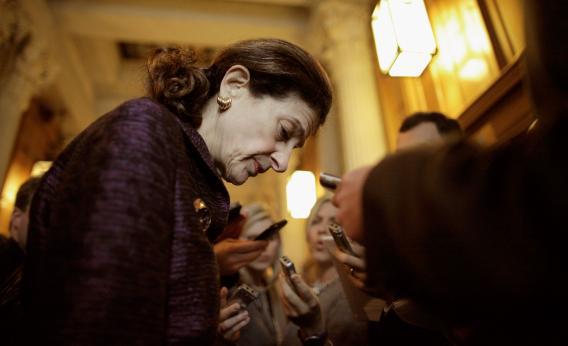On economic policy at least, I have what I think are pretty moderate views so I always want to look back fondly on the contributions of self-proclaimed moderate politicians. But while centrist legislators almost invariably end up playing a pivotal role in America’s major policy debates, looking back at Olympia Snowe’s self-indulgent farewell op-ed in the Washington Post one can’t help but be struck by the lack of really meaningful impact that Snowe has had on the course of policy. She complains about the relative disempowerment of moderates in the political system, but the nature of Congress’ institutional rules is that generally nothing happens without the agreement of moderates. It’s true, as Snowe writes, that the quantity of moderate members has declined but that means that the influence of the remaining ones—i.e., Olympia Snowe—is greater than ever.
Snowe writes, “In a politically diverse nation, only by finding that common ground can we achieve results for the common good.” I think the question is what steps did Snowe personally take to use her considerable power to advance the common good?
I think about two noteworthy incidents. One is 2001 when the new president, George W. Bush, wanted to implement large regressive debt-financed tax cuts. Snowe held a decisive position in the bargaining over this, and she chose to use her influence to secure instead the passage of a slightly smaller regressive debt-financed tax cut package. Then in 2009 when the new president, Barack Obama, wanted to implement large tax-and-spending side stimulus, Snowe again held a decisive position. She chose to use her influence to trim down the spending side of the package, with a particular focus on reducing federal financial assistance to state and local governments. Were these good ideas? It seems to me that they were not good ideas. That there was, in fact, no logic behind them. The policy logic behind the Obama stimulus clearly dictated a bigger rather than a smaller package of aid to state and local government, but if Snowe rejected the policy logic behind the Obama stimulus she could have simply rejected the whole idea. Similarly, the policy logic behind the Bush tax cuts (“Reagan proved deficits don’t matter”) argued for the Bush proposal while the policy logic of rejecting debt-financed semi-permanent tax cuts argued for rejecting Bush’s whole approach. These were the key moments in recent American budget history. Polarization and partisanship aside, she had plenty of power at these moments. She just failed to use the power to any meaningful effect. Absolutely nobody is walking around saying, “The Bush tax cuts were great, but I’m sure glad they were slightly smaller than the president originally proposed.” Taking advantage of the low interest rate environment of the aughts to pass regressive tax cuts was either a good idea or it wasn’t. Opinions on the American Recovery and Reinvestment Act are sharply divided, but approximately zero people believe the Snowe/Collins/Specter/Nelson compromise version of ARRA was the right thing to do. That’s not because of “polarization”; it’s because their position didn’t make any sense on the merits and just reflected a mindless less is better than more mentality.
Note that when Snowe bows out she, like Evan Bayh before her, doesn’t go out bragging about her accomplishments even though she was one of the very most influential politicians of the Bush and Obama eras. She doesn’t have an “I faced my share of frustrations, but I’m glad I did this” moment despite her pivotal role in key debates. Is she proud of scaling back ARRA while ensuring its passage? Is she glad she helped get Dodd-Frank over the finish line? Were the Bush tax cuts a good idea?
